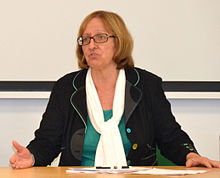Anne O'Garra
Anne O'Garra | |
|---|---|
 | |
| Born | 1954 (age 70–71) |
| Website | http://www3.imperial.ac.uk/people/a.ogarra |
| Scientific career | |
| Thesis | Adhesion of coagulase negative staphyloccoci to human ephithelial cells (1983) |
| Website | www |
Anne O'Garra FRS FMedSci (born 1954)[1] is a British immunologist who has made important discoveries on the mechanism of action of Interleukin 10.[2][3]
Early life and education
O'Garra was born in Gibraltar. From 1977 to 1980, she studied at Chelsea College, University of London, and graduated with a B.Sc. (First Class Honours) in Microbiology and Biochemistry.[4]
Biography
She received her bachelor's degree in microbiology and biochemistry at the University of London. At the NIMR, she earned her Ph.D. in microbiology, staying on there for a four-year post-doctorate in immunology.
In 1987, O'Garra left England for Palo Alto, California, to work for the DNAX Research Institute, where by 2000 she had become a principal staff scientist in the department of immunobiology.[5] In 2001, O'Garra became the Head of the Division of Immunoregulation at the MRC National Institute for Medical Research (NIMR) in London.[6] Since 2015, she is Associate Research Director at the Francis Crick Institute, the successor institute to the NIMR.
Research
O'Garra is known for her contributions to the understanding of the intricate network of cell-cell and cytokine interactions regulating the induction and suppression of cellular immune responses. She was the first to discover the immunosuppressive functions of Interleukin-10 (IL-10), which inhibits antigen presentation by dendritic cells and macrophages and reduces their production of proinflammatory cytokines. She also discovered that dendritic cells produce the interleukin essential for activation of T-cells (IL-12) and subsequent eradication of intracellular pathogens and that IL-10 regulates this production. [7]
Awards and honors
She is a fellow of the Royal Society, the American Association for the Advancement of Science (AAAS), and the Academy of Medical Sciences.
References
- ^ "Driving change in tuberculosis research: an interview with Anne O'Garra". Disease Models & Mechanisms. 6 (1): 6–8. 24 December 2012. doi:10.1242/dmm.011429.
- ^ Anne O'Garra Profile
- ^ Moore, Kevin W.; de Waal Malefyt, Rene; Coffman, Robert L.; O'Garra, Anne (2001). "INTERLEUKIN-10AND THEINTERLEUKIN-10 RECEPTOR". Annual Review of Immunology. 19 (1): 683–765. doi:10.1146/annurev.immunol.19.1.683. ISSN 0732-0582. PMID 11244051.
- ^ "Profile Anne O'Garra" (PDF). ENII. Retrieved 29 July 2013.
- ^ "ScienceWatch".
- ^ "National Institute for Medical Research". Archived from the original on September 17, 2009. Retrieved July 19, 2010.
{{cite web}}: Unknown parameter|deadurl=ignored (|url-status=suggested) (help) - ^ "Royal Society New Fellows 2008".
- 1954 births
- Fellows of the Royal Society
- Female Fellows of the Royal Society
- Fellows of the Academy of Medical Sciences
- Gibraltarian people
- Members of the European Molecular Biology Organization
- British immunologists
- Living people
- National Institute for Medical Research faculty
- Fellows of the American Association for the Advancement of Science
- British scientist stubs
- Gibraltarian people stubs
